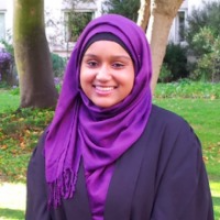Farhana Rahman
 Cambridge International Trust and Murray Edwards Scholarship
Cambridge International Trust and Murray Edwards Scholarship
Rickety Boats to Refuge(e): Gender, Identity, and Everyday Negotiations of Rohingya Refugee Women
Supervisor: Professor Manali Desai (Department of Sociology)
Farhana Afrin Rahman is a Leverhulme Early Career Fellow and Isaac Newton Trust Fellow at the Department of Politics and International Studies, University of Cambridge, as well as a Junior Research Fellow at Wolfson College Cambridge. Prior to this, she was a JSPS Postdoctoral Fellow at the University of Tokyo, a Non-Residential Fellow at the Centre for Asia Pacific Refugee Studies at the University of Auckland, and a Fellow at the Harvard University Asia Center. Farhana received her PhD in 2021 from the University of Cambridge's Centre for Gender Studies. Her PhD dissertation was shortlisted for the 2023 ICAS Best Dissertation Prize, and received the accolade for "Most Accessible and Captivating Work for the Non-Specialist Reader". She also holds an MPhil in Multi-Disciplinary Gender Studies from the University of Cambridge (2014), and an Honours Bachelor of Arts in Peace and Conflict Studies, International Relations, and Arabic from the University of Toronto (2011).
Farhana's first book, "After the Exodus: Gender and Belonging in Bangladesh's Rohingya Refugee Camps", is forthcoming in 2024 with Cambridge University Press. Through feminist ethnographic research, the book explores how the mass exodus of the Rohingya community to the refugee camps outside of Cox's Bazar, Bangladesh has affected the gendered subjectivities and lived experiences of Rohingya refugee women. Her Leverhulme project is a multi-sited ethnography exploring the transformation of gendered dynamics after forced migration at different geographic endpoints – the "camp" and the "city". Farhana's peer-reviewed articles and chapters have been published in various journals and edited volumes, including Journal of Refugee Studies, Feminist Review, and Journal of International Women’s Studies.
Farhana is a recipient of the UNESCO Silk Roads Research Grant 2023 where she is currently conducting a project titled "Gendered Fields of Red Gold: Women and Saffron Along the Silk Road". She is also co-founder of Silkpath Relief Organization (silkpathrelief.org), a non-profit providing humanitarian assistance to individuals devastated by calamities – in Afghanistan, and with Rohingya refugees in Bangladesh and Malaysia. In 2015, she helped to establish the first academic program in gender studies in Afghanistan, based at the American University of Afghanistan in Kabul, where she was a lecturer. Since 2014, Farhana has worked as a consultant providing technical expertise and trainings on gender equality, social policy, and human rights for various projects across the globe. For her extensive research and work contributions to the field of gender and development, Farhana was the 2021 recipient of the Paula Kantor Award from the International Center for Research on Women (ICRW).
